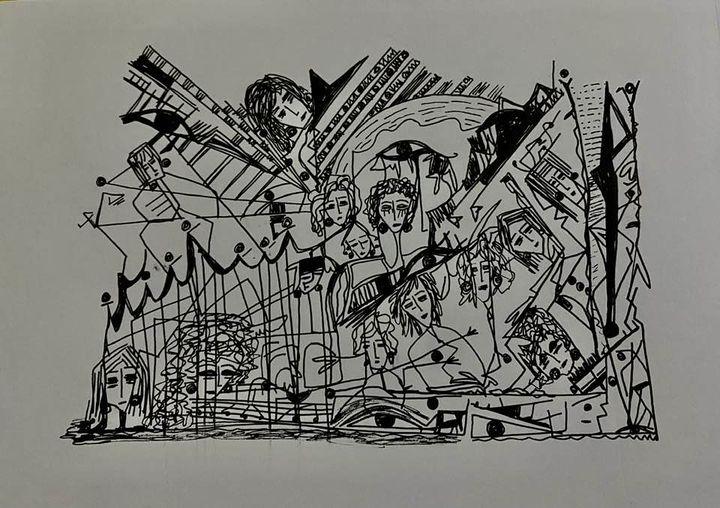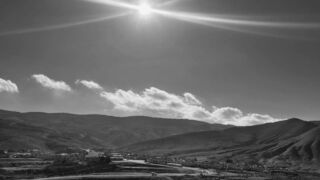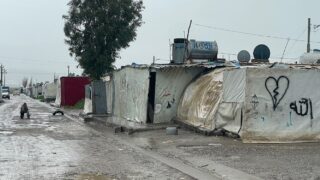In the maze of painful stories and ongoing suffering that so often go unheard, there are things society buries beneath the blanket of shame. There are realities that are met with the indifference of men, local authorities, governments, and even humanitarian organizations. Among these is the overlooked privacy of women living in displacement camps. For instance, menstruation adds strains both mental and physical to women’s daily tasks and performance. Some women may yearn for an hour of solitude or a sliver of silence that remains out of reach until every family member has finally gone to sleep. The dream of peace and a quiet escape from the noise of a tent shared with six or more people in just six-by-four meters of space, seems almost impossible, with the constant presence of men who struggle to find employment opportunities.
During my ten years- and counting- in a camp nestled in the mountains of northern Iraq, I have watched women queue for food baskets, heave barrels of kerosene, and patch up their worn-down tents. They rarely complain about the lack of support, and they often have to ignore their mental health to survive cold winters, searing summers, and year-round hunger. Grieving the dead while feeding the living left no space for their womanhood. They forgot their needs, rarely complained, and cared little about describing their days to others.
Death is a Woman from Şingal
05-06-2024
Every story has its hero, its villain, its victim, and its victor. But in these women’s stories, each woman is all of those characters combined. There is the young woman who grieved her brother’s death- who had her hair cut and was clothed in mourning attires at just seventeen. There is the woman who fled the president’s bombs only to face the jarring suicide of a friend in the camp. There’s the girl who couldn’t even talk about her period pains to her own sister because men filled every corner of their tent. And there’s the woman who sneaks beyond the camp’s borders just to take a breath; to set free the caged birds of her freedom outside the confines of that place.
And then there are the hundreds of thousands more who remain silent, not because they have no stories to tell, but because they seek to avoid the shaming labels society so readily assigns, or worse, because they know that speaking out is futile in a world where they are treated as numbers- bargained over and sold on the ledgers of war and diplomacy.
Some of these women have spent more than a decade in the camp. It’s where they grew up and where they went to school. This life has shaped how they see the world - and how they see themselves. Others have forgotten who they once were, before they were transformed into slowly decaying creatures in their nylon tents. Some escaped death at the hands of those meant to protect the homeland, only to shelter in tents that could go up in flames at any moment.
But there are those who tell their stories. One of them asked me, “But who is listening?” I responded, with a pained smile on my camp-worn face: “I listen!” I listen and I write. But I, too, wonder: “Who reads?”
Maria: They killed me, but I rebirthed myself
In an interview with us, Maria (pseudonym), 21, shares her struggles with life and death in Cham Mishko, a camp in the far north of Iraq, inhabited by a majority of Yazidi and Muslim families, all originally from the city of Sinjar:
“After my brother committed suicide, the tent where he'd hung himself from the pole became too suffocating for my mother. We moved to another tent, as if by changing our tents we would escape death and leave its pains behind. But we couldn’t. He was in every breath we took; in every morning we opened our eyes to welcome a new day. After that shock, I often used to pound the ground with my bare hands, until I lost consciousness. I never lost my ability to feel immensely; the pain was still there, inside me.”
I can't sleep in the dark. His death is present, yet he's absent. If I do fall asleep, which usually happens when my body is exhausted after a long sleepless night, I have nightmares in which I see people hanging by their necks, just the way he was. My brother would look at me with bewildered eyes. I often think that if we had been in a better place, away from the camp, he wouldn't have committed suicide. He wouldn’t have escaped through death. I blame myself a lot because, at that time, I was too engrossed in my studies, trying to pass the baccalaureate exam. I didn't really look at him until his last moment. I still remember his faint smile and his final glance at me. I wonder: Was his suicide due to the neglect of those around him? I feel like my hand that untied the rope around his neck is stained with his blood, and so does my family. Every time my mother looks at me, her look tells me that I'm to blame, without her actually telling me.
It was almost 4:00 a.m. when I woke up that day. My uncle held my hand and led me to the tent, which was full of feelings of loss, blame, grief, and recurring questions. I laid my head on my uncle’s shoulder, and my grandmother grabbed my hair and cut my braid[1]. At that moment, I felt as if I had died too. I wanted to keep my cut braid, but it was already gone.”
“I still remember my friend's suicide. We were in 12th grade, our last year of high school. She used to study hard, and their house was just like ours. As students, we were under tremendous mental stress, but each of us dealt with it differently. She once asked us, “If I died today, would that make you sad for me?” We took her question for some kind of joke, but the next day, we received news of her suicide.”
Regarding her experiences during her period, the psychological toll it takes, and the lack of privacy in the camp, Maria shares:
"I get irritated easily. I know no one is to blame for what I'm going through, but it's not my fault either. I couldn’t sleep because of the constant noise and movement around me. I had to wait until everyone else was asleep just to enjoy the rare luxury of silence. I suffered from a severe headache and, in the end, resorted to taking a sedative—something I now rely on daily. I went for a walk alone and eventually crossed the camp's fence, where the mountains are. There, I could imagine freedom—just imagine it."
She continues, "My inability to study and prepare for my final exams has created a persistent psychological burden, which contributed to worsening my mood. I don't have a private space for my belongings. I carry it all, everything, inside my heart, outside the camp.”
Maria says, "The feeling that I was being blamed for my brother's suicide, my confinement in this camp simply because I was born in a particular city with a certain religious identity, and the lack of ways out—all of it contributed to “Maria's death”. But I chose to rebirth myself. I now see a psychiatrist at my own expense, and I believe I’ve getting stronger.”
Khayal: I don’t have the luxury of lying down in the tent
Khayal (pseudonym), 26, has lived in the Cham Mishko camp for the displaced with her family for the past 10 years. She recalls that during the first year, especially in the early months, there was no running water in the bathrooms. Women had to carry water in buckets, even when they were exhausted, depleted, and still haunted by memories of war. They had to walk for long distances to fetch water to escape the repetition of the horrors of August 2014, when many Yazidis died of thirst on Mount Sinjar during ISIS’ attack.
“I often think that if we had been in a better place, away from the camp, he wouldn't have committed suicide. He wouldn’t have escaped through death. I blame myself a lot because, at that time, I was too engrossed in my studies, trying to pass the baccalaureate exam. I didn't really look at him until his last moment. I still remember his faint smile and his final glance at me. I wonder: Was his suicide due to the neglect of those around him?”
“My uncle held my hand and led me to the tent, which was full of loss, blame, grief, and recurring questions. I laid my head on his shoulder, as my grandmother grabbed my hair and cut my braid. At that moment, I felt as if I had died too. I wanted to keep my cut braid, but it was already gone.”
Khayal was a teenager at the time. With entertainment absent, she turned to a small television her family had brought with them. Most of the time, she would let cartoons transport her to other worlds. But when she would hear the voice of a family member in the tent, she was reminded that she was still trapped in the camp.
Khayal lived in the tent with seven people. She said that had they been nine, they would have been given two tents.
She described how during her period, despite the almost continuous pain and exhaustion, she could never lie down as she would like after coming back from work to the tent, where her father and brother spent most of their time. The pain would sometimes become so unbearable that she wished for just one hour of uninterrupted sleep, when no one would wake her up to ask her to do something for them. She wished for time to cry as she’d like and to lie down as she pleases.
Khayal said that the meaning of freedom, to her, was the ability to lie down comfortably. But the camp’s walls are a prison to freedom and all its meanings. “I needed a space where I could recover from the pressures of work before stepping into the tent and seeing them. I just wanted to be quiet and rest freely. But they were always there. We were there.”
Khayal said she had never come across any initiative, governmental or non-governmental, focused on supporting women and their needs in the camp. If such efforts existed, they were neither visible nor widespread. She says:
“I wish the men in my family, at least, had taken the initiative to talk about these things, to make them easier. I wish they had educated themselves a little. If they asked me to do something, or to cook a meal, and I said I couldn’t, I wish that they would ask “why”, so I could explain how much I was suffering that day, how much my mental health suffered from the lack of privacy… This instability has left me unable to plan for the future. It makes it impossible to have goals and dreams. I was denied the ability to even imagine a future. I live haphazardly, just going along with the crowd to nowhere.
When I think about today and how it went, it feels like nothing important happened. When I think about tomorrow, I feel like it’s out of my reach. There is no ‘tomorrow morning’, but there is a fence around the camp, enclosing it, imprisoning me, preventing me from seeing what I can become.”
Khaula Sido, a graduate of the Department of Obstetrics and Gynecology who works as a midwife and with humanitarian organizations, shared in an interview with us:
“It’s not just about the violation of women’s privacy, though that alone should prompt serious reflection and dialogue, and must be recognized as a collective responsibility by all members of society, to educate oneself. What’s even more alarming is that some women are being forced to engage in sexual intercourse during their periods, or even beyond the first trimester of pregnancy, up to the sixth month. This is sexual assault that poses serious mental and physical risks, including bleeding, miscarriage, and the potential transmission of infections.”
The Land of Clipped Braids
23-03-2025
Sido emphasized that women must be liberated from the societal restrictions imposed on them and should be free to exercise their rights without needing to explain or justify themselves. She noted that many women are still expected to perform housework and serve their husbands, regardless of their physical or psychological condition, including fulfilling ‘sexual demands’.
Despite the continuous pain and exhaustion during her period, Khayal could never lie down as she pleased after coming back from work to the tent, where her father and brother spent most of their time. The pain would sometimes become so unbearable that she wished for just one hour of uninterrupted sleep. Khayal said that the meaning of freedom, to her, was the ability to lie down comfortably.
“I wish the men in my family, at least, had taken the initiative to talk about these things. I wish they had educated themselves a little. If they asked me to do something, or to cook a meal, and I said I couldn’t, I wish that they would ask “why”, so I could explain how much I was suffering from the lack of privacy. This instability has left me unable to plan for the future. I was denied the ability to even imagine a future.”
In 2021, Sido collaborated with Jesuit Refugee Service (JRS) to teach 200 women and men about hormonal changes and the importance of approaching women’s issues and bodies with care and respect. Sido hoped that those trainees would go on to train others and help spread awareness. Unfortunately, the reality has shown the opposite.
On the other side of Iraq’s tragedy, there’s the Syrian tragedy. Conditions are even worse in the camps sheltering Syrians who fled the brutal war and authoritarian rule in their homeland.
I spoke with a Syrian woman living in the first Domiz refugee camp, located in Duhok Governorate in the Kurdistan Region of Iraq. The camp was established in 2011 following the outbreak of the Syrian civil war.
Layla: We escaped Bashar
Layla (pseudonym), 21, shared her story:
“An hour after we fled Douma, in the Rif Dimashq governorate, the city was bombed. We escaped Bashar, searching for safety, but life in the camp has been no less brutal. In the early years, there was no drinking water. We had to either buy it or carry it from far away. For displaced and refugee families like ours, survival was all we could think about. We lived one day at a time, never knowing what tomorrow might bring.
At any moment, a fire could break out and wipe out entire sections of the camp, either from the summer heat, an electrical overload, or a heater left on in a tent during winter. In the cold months, we were even afraid to use the heat.
We were seven girls and two young men, living together in a tent. The two boys were my cousins, who weren’t given a tent of their own because they were considered ‘without family’.
During that time, I threw myself into my studies. I believed education was my only escape, and the only way to cross the walls of the camp. But here I am, 12 years later, after having graduated from the Nursing Institute. The camp is still here. And I still live the way I did on the very first day we arrived.
Getting a bit of peace and quiet was my wish that never found a way of coming true. The lack of it took a toll on my academic performance. My friends and I used to wait until one of our tents was empty, so we could meet up and study together.
During my period, I would wait for the men to leave the tent so I could take care of my body or simply talk freely with one of my sisters. I longed to free myself from the tangles of cobwebs that fell over me from the sky, just as the bombs fell on my city.”
“This situation left me with a sense of aversion toward everyone,” Layla said. “For example, when I was studying at the institute, my happiest moments were those I spent alone on a bench in the university garden. I don’t even know why I enjoy solitude—but, I do. My social life was nonexistent because I was too afraid to go out after a series of kidnappings at the camp. I was scared to interact with anyone.”
I asked Layla whether there had been any governmental or non-governmental initiatives to organize activities—such as sports, art, or entertainment programs—to ease the psychological burdens on women, as is common in refugee camps. She answered:
“No. But when the residents of the camp got an opportunity to turn some nylon tents to makeshift rooms, this made things a little easier for the women. The process is as follows: residents were given the option to replace their tents with brick rooms. There were two choices. The first was to build a room of a specific size and design, with partial support from humanitarian NGOs. But these rooms were too small for seven people, and the ceilings were made of suspended plastic, vulnerable to wind and fire. The second option was for families to build two or more rooms, instead of their tent. But in that case, the NGOs refused to provide support, and the families were forced to cover all construction costs themselves.
I still remember my friend's suicide. We were in 12th grade, our last year of high school. She used to study hard, and their house was just like ours. As students, we were under tremendous mental stress, but each of us dealt with it differently. We were hanging out together, and my friend asked us, “If I died today, would that make you sad for me?” We took her question for some kind of joke, but the next day, we received news of her suicide.
“We escaped Bashar, searching for safety, but life in the camp has been no less brutal. In the early years, there was no drinking water. We had to either buy it or carry it from far away. For displaced and refugee families like ours, survival was all we could think about. We lived one day at a time, never knowing what tomorrow might bring.”
“During that time, I threw myself into my studies. I believed education was my only escape, and the only way to cross the walls of the camp. But here I am, 12 years later, after having graduated from the Nursing Institute. The camp is still here. And I still live the way I did on the very first day we arrived.”
The camp is surrounded by a fence. Behind it are half-finished building structures. My friend ran toward the buildings, and her father chased after her, trying to bring her back. She threw herself from the fourth floor.
This incident was enough to instill fear within us. We feared that any one of our friends might kill herself at any moment. It terrified me in particular because it made the specter of suicide a constant presence in my imagination. What would happen if I died today? Would anyone mourn me? Would it make any difference in the world?”
- Cutting the hair of women and girls, or pulling it, is a tradition still practiced today in the Yazidi community, to express grief over the dead. ↑




